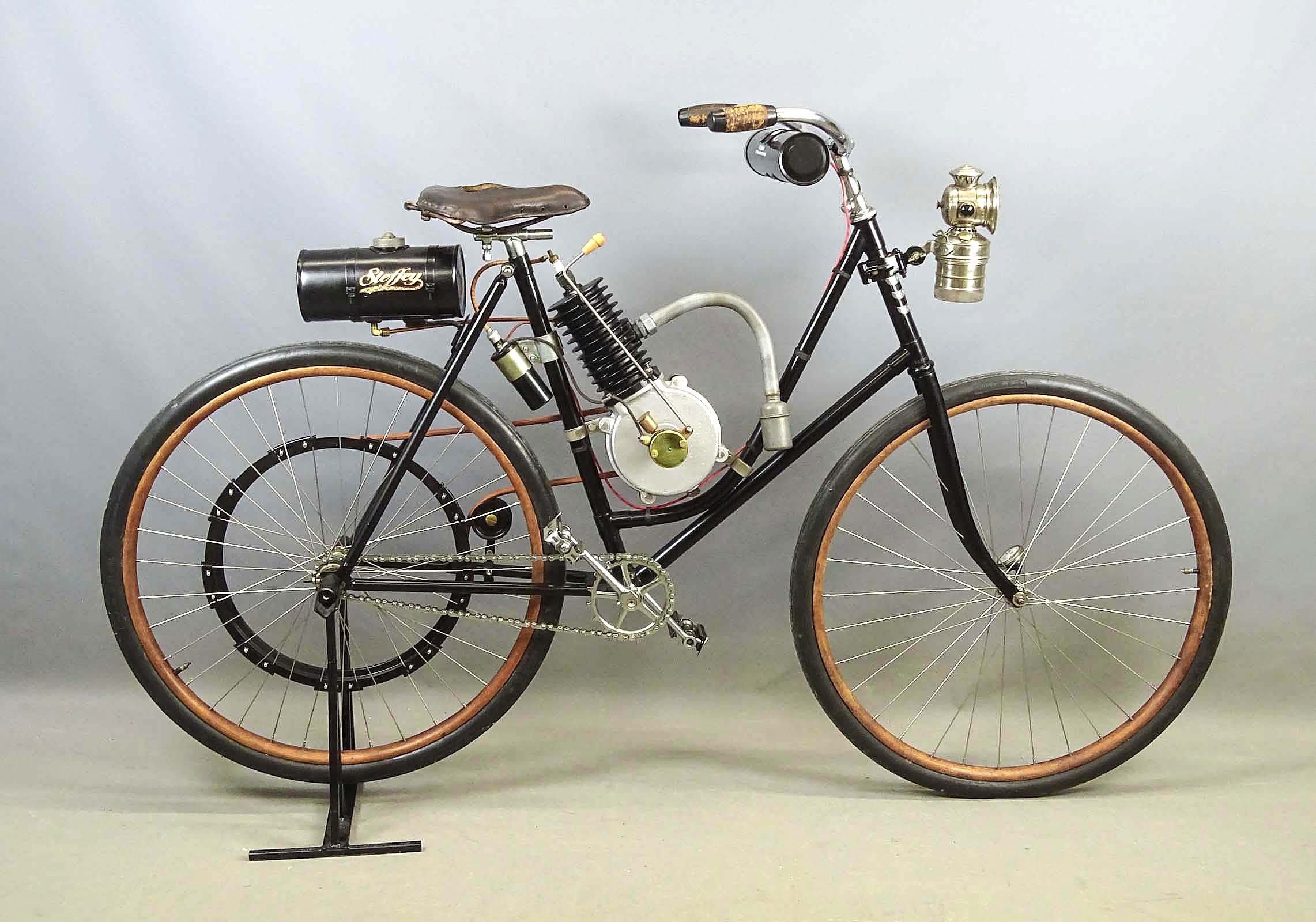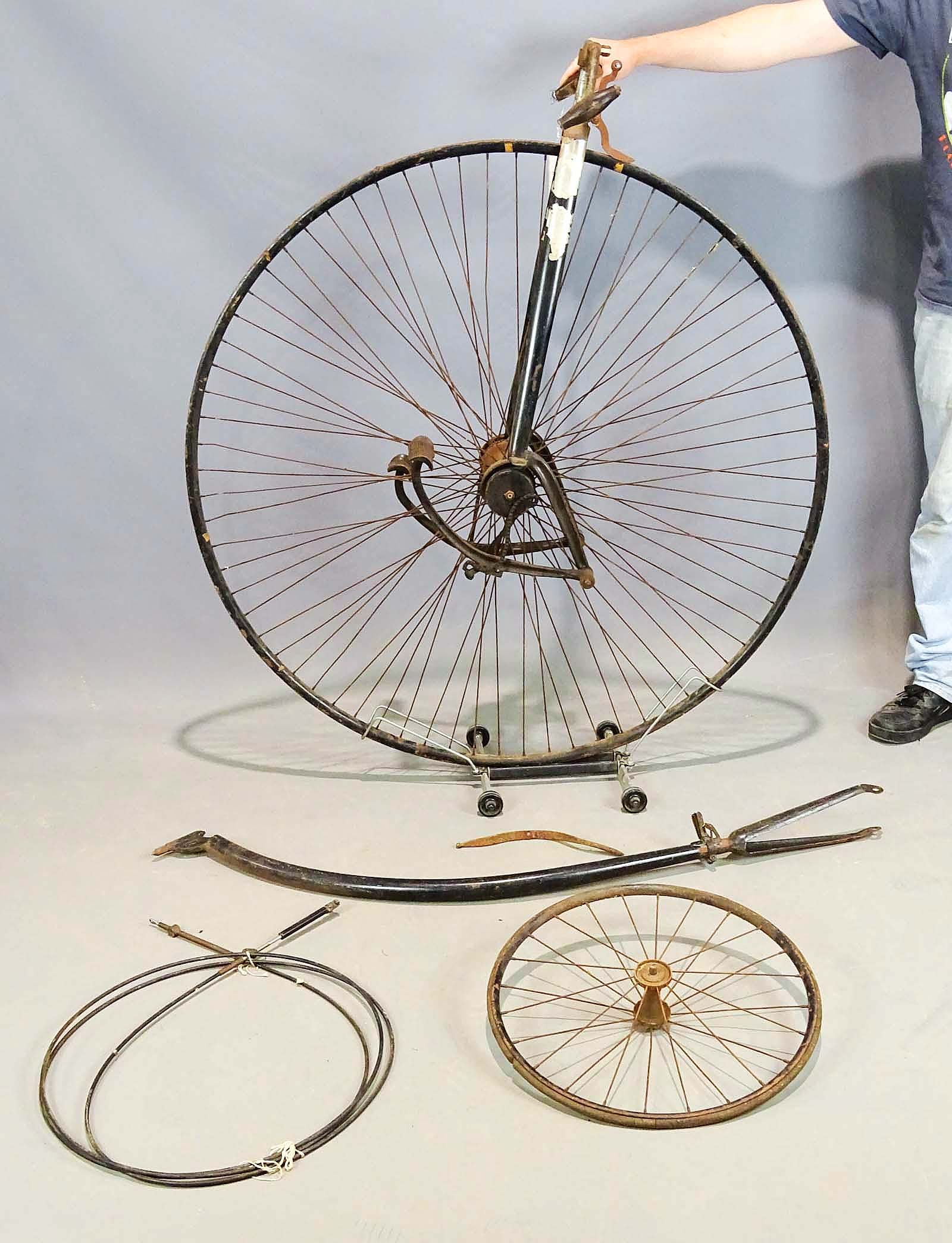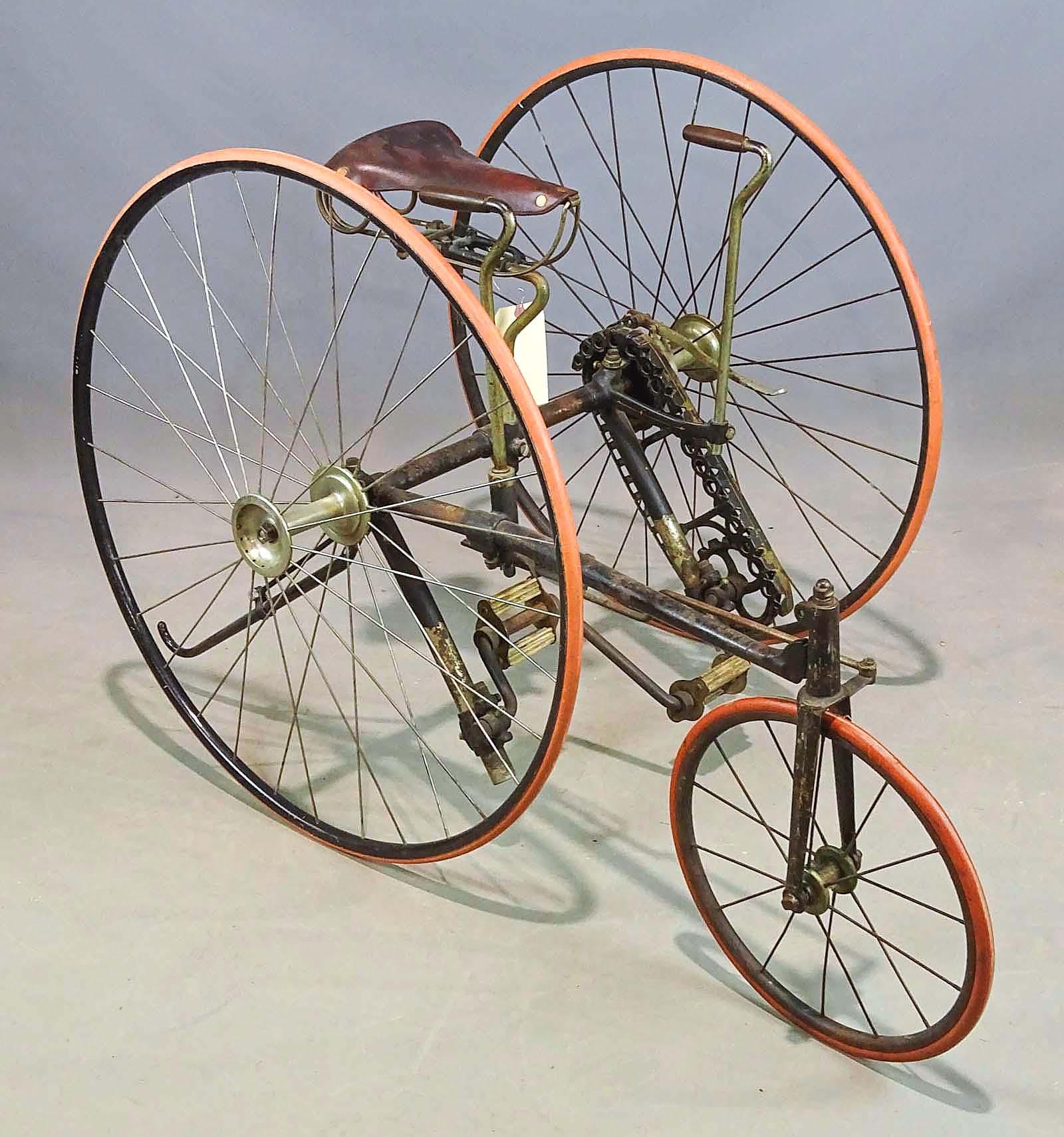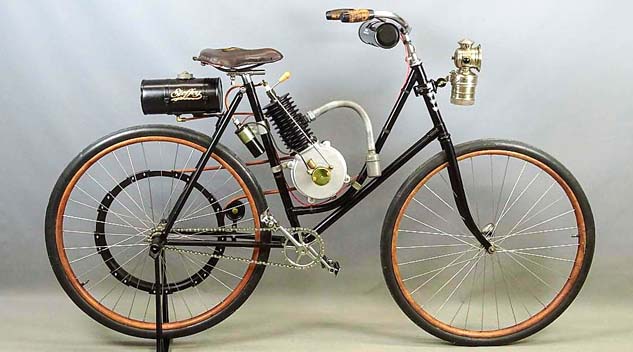#31st #Annual #Copake #Bicycle #Auction #International #Bidding #Wheels #Turning #Antiques #Arts #Weekly

Steffey Manufacturing Co. in Philadelphia produced motors and bicycle attachments in the early Twentieth Century. Motors were attached to existing bicycles like this stunning 1902 example. The rare motorized bike featuring a carbide head lamp and a cyclometer by New York Standard Watch Company rode away in top position at $30,000; it sold to a Midwest museum ($20/25,000).
Review by Jessica Kosinski; Photos Courtesy Copake Auction
COPAKE, N.Y. — Copake Auction conducted its 31st annual bicycle auction on Saturday, October 21. Father and son co-owners Michael and Seth Fallon conducted the sale, which included a pre-sale swap meet held on Friday, October 20. Among the 935 lots, only 14 failed to sell for a sell-through rate of more than 98 percent. At press time, the cumulative total for all sold lots was $670,000, with proceeds partially benefiting St Jude Children’s Research Hospital, a charity the Fallons report Copake has supported for several years.
The sale attracted approximately 1,000 bidders from 30 states and six countries. According to Seth, “It was in the top five highest grosses we have had in business. Every single seat in the gallery was reserved, and it was standing room only!” The top 16 lots sold to buyers within the country, but one lot among the top 30 — a Victor hard tire safety bicycle — found a new home in Italy.
When asked what attracts bicycle buyers, Seth stated, “It really depends. High wheels always gather interest, also rare early machines tend to gather interest (hard tire safeties, pneumatic safeties etc.). Bicycle collectors love items in original “as found” or “barn fresh” condition. That being said, they still have to be in good condition within reason.” Michael indicated carefully restored bicycles also often sell well.

This circa 1880s 48-inch King high wheel bicycle was produced in Chicopee, Mass., by Ames Manufacturing Co. Started in the 1820s — incorporated in 1834 — Ames produced items over the years ranging from ice skates to bayonets. Its bicycles were produced from the early 1880s through 1887. A buyer, undeterred by its need for restoration, purchased this bike for $9,688 ($2/3,000).
A 1902 bicycle from Steffey Manufacturing Co. (Philadelphia), Penn.) stole the show. According to Michael, it is quite rare. Steffey was in the unusual business of creating motors for attaching to existing bicycles, making them precursors to modern motorcycles. A museum in the Midwest purchased it for $30,000. The same museum also won the fifth place lot, a hard tire safety bicycle with the earliest known derailleur, for $9,600.
The second place lot, a circa 1886 Pony Star Serial Number One, found its new home for $10,200. It was one of three bikes in the top 16 produced by H.B. Smith Machine Co. (Smithville, N.J.). All three were high wheels, also known as penny-farthings, which were popular in the 1870s and 1880s. They offered excellent shock absorption and fast travel with minimal pedaling effort. However, mounting and dismounting was hazardous. The two other Smith bikes gaveled down for $9,600 and $6,480. Other high wheels among the top 16 included an 1876 Ariel ($9,720), an 1880s King ($9,688) and an 1890s Eagle ($8,400). A semi-related top lot was a Kangaroo dwarf safety bicycle, which resembled a shrunken high wheel and went home with a buyer for $9,300. It was designed by Hillman, Herbert & Cooper Ltd. (Coventry, England), to maintain high wheel efficiency while improving safety.
Other popular categories among the top lots included hard tire and pneumatic safety bicycles. Safety bicycles were designed to be safer to ride than high wheels. Modern bicycles are still technically safety bicycles, but the term and need for comparison became obsolete when high wheels went out of fashion. Rex Cycle Co. (Chicago, Ill.) and Bamboo Cycle Co. (England) examples were two of the top pneumatics. The term “pneumatic” refers to bicycles with tires filled with pressurized air. The Rex fetched $8,100, and the Bamboo, $9,300. Rex created its unique design with a third wheel in the back for better shock absorption. Bamboo was the first company to patent bamboo bikes. Among the hard tire top lots, the Columbia was particularly attractive to bidders. Columbia (Westfield, Mass.), founded in 1877, was America’s first manufacturer of bicycles. That bike rode to a strong finish for $7,560.

This 30-inch Gormully & Jeffery child’s two-track tricycle is quite unusual. The company, founded in Chicago in 1879, was the second bicycle manufacturing company established in the United States. This bike came to auction from the New Hampshire collection of James Hetzer in partially restored condition, with a reproduction wheelie bar and new leather and rubber but otherwise original. It zoomed past its estimate, selling for $8,400 ($1,5/2,500).
Two unique lots completed the top 16. The first was a two-track tricycle garnering an $8,400 top bid. American bicycle manufacturer, Gormully & Jeffery (Chicago, Ill.) produced this particular 30-inch child’s tricycle, but the design was most popular in England at the time, making the Gormully & Jeffery tricycle unusual. The second was a Nineteenth Century boneshaker bicycle with interchangeable parts thought to be the first design of its kind. It sold for $6,600 after getting bidders’ wheels turning.
Although none made the top 16, there were many bicycle-related lots that crossed the block as well. They included unique bicycle-themed items appealing to a wide range of collectors. Among them were a bronze clock-barometer combination in the shape of a gentleman riding a safety bicycle and a Eureka bicycle hub lamp, which was one of several hub lamps featured. Many lots also consisted of books, posters and postcards with bicycle themes.
Copake has scheduled an upcoming 800-lot sale on Saturday, November 25.
Prices quoted include the buyer’s premium as reported by the auction house.
For information, 518-641-1935 or www.copakeauction.com.




